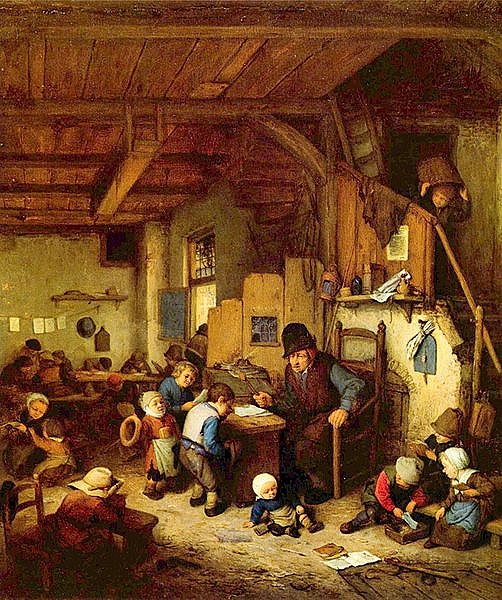Pauseperity

Adriaen van Ostade: The Schoolmaster, 1662
"What doesn't humble you makes you smug."
Our Pandemic has paused our planned prosperity. The Pestilence Horseman of the Dreaded Apocalypse rides roughshod through our society, heartlessly mowing down more than our fellows, for avoiding him drove us to flee from our jobs, our schools, and our precious, precocious society. One day, our economy seemed to be humming right along. The next day, it forgot that song: words, tune, the whole shebang. Even those who had subscribed to the widely popular Prosperity Gospel suspended their pursuit when manifestation moved from being a simple matter of personal motivation to one of humbled recognition and acceptance. Overnight, consumption turned cruelly inconspicuous when not even a stockpile of Benjamins could buy you toilet paper. We became jobless paper paupers instead of employed paper prosperous, suddenly unable to maintain appearances. Flow stalled. ©2020 by David A. Schmaltz - all rights reserved
The I Ching spoke of disruptive calamity overturning accustomed order, but those stories seemed more like history than current affairs. The more optimistic among us speak of unexpected opportunity while the rest hunker down. The route we'd planned washed out and we're suddenly uncertain of our alternatives. We survey the surprising new landscape without seeing a clear path through, our recent certainties shockingly suspended. Where prosperity formerly seemed a sort of birthright, its inevitability doesn't seem so likely now. I reduce my expectations, hoping to simply survive in lieu of thriving, which seems completely out of reach now. We have entered a period of Pauseperity.
Societies have previously survived periods of Pauseperity, though usually not through clever planning. They poked sticks into pervasive darkness, uncertain what might help and what might hinder. Life turns experimental, hypothetical until proven workable, generously paved with short-term failures. Persistence in the absence of reinforcing successes seems essential. Speculation could replace prudent investment. Desperation will also drop in and probably overstay its welcome. Faux masters will most certainly emerge, encouraging with hollow promises but also sparking hope, which might well become more treasured than any actual treasure, which seems absolutely inaccessible now. Those with hope might thrive with plenty of nothing.
We believe in eventual reprieve, though none of us can see just when those freedoms might be reinstated. We reject all predictions of permanent reductions of expectations, for we live in perpetual anticipation and cannot otherwise survive. It always was a lie that our children would necessarily thrive, but we cannot believe otherwise without forfeiting our underlying society. We always were Next Year People, seeing setback as temporary and eventual dominion as inevitable. We have always been who we expect to become, dissatisfied with who we have become so far, and this recent setback will not dissuade us from our faith. It might severely challenge our faith, but we will not lose it unless we first lose our lives. We think of ourselves as survivors, even when we've lost 80,000 and still counting upward.
The Pauseperity Gospel cautions us to keep our heads. We have plenty to dread but we dare not shed our faith that we will, one day, make headway again; maybe not today and probably not tomorrow, but one day. We must suspend some of our formerly essential neediness for now and promise ourselves future rewards for our present discipline. We shall want plenty but settle for enough instead, and perhaps for even less than enough. Temptation will occasionally trample our serenity, but we dare not yield. After we survive, we can claim that the hardships didn't manage to kill us, and we'll certainly seem rather self-important for our grit. Our spirit might break, but we'll try to believe that even broken spirits can mend. We might even become Zen-like in our unaccustomed humility. What doesn't humble you makes you smug. We hug by bumping elbows for now.


